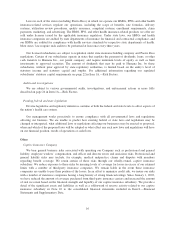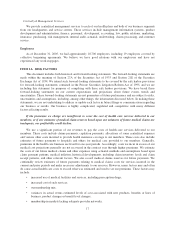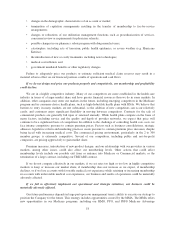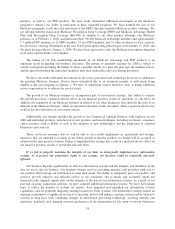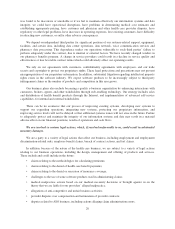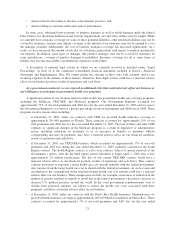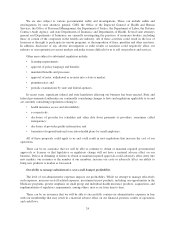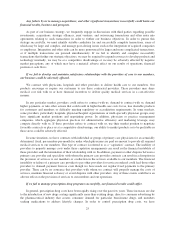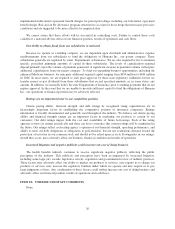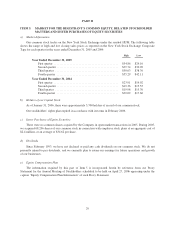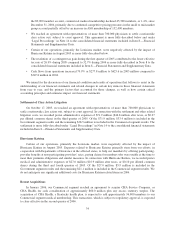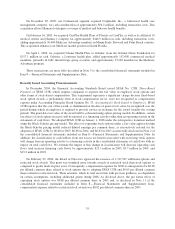Humana 2005 Annual Report Download - page 36
Download and view the complete annual report
Please find page 36 of the 2005 Humana annual report below. You can navigate through the pages in the report by either clicking on the pages listed below, or by using the keyword search tool below to find specific information within the annual report.implemented multi-tiered copayment benefit designs for prescription drugs, including our four-tiered copayment
benefit design, Rx4 and an Rx allowance program structured to account for those drugs that treat more pervasive
conditions and are suggested to be more effective by empirical data.
We cannot assure that these efforts will be successful in controlling costs. Failure to control these costs
could have a material adverse effect on our financial position, results of operations and cash flows.
Our ability to obtain funds from our subsidiaries is restricted.
Because we operate as a holding company, we are dependent upon dividends and administrative expense
reimbursements from our subsidiaries to fund the obligations of Humana Inc., our parent company. These
subsidiaries generally are regulated by states’ Departments of Insurance. We are also required by law to maintain
specific prescribed minimum amounts of capital in these subsidiaries. The levels of capitalization required
depend primarily upon the volume of premium generated. A significant increase in premium volume will require
additional capitalization from our parent company. To fund our expanding business opportunities, including the
enhanced Medicare business, we anticipate additional required capital ranging from $450 million to $650 million
in 2006. In most states, we are required to seek prior approval by these state regulatory authorities before we
transfer money or pay dividends from these subsidiaries that exceed specified amounts, or, in some states, any
amount. In addition, we normally notify the state Departments of Insurance prior to making payments that do not
require approval. In the event that we are unable to provide sufficient capital to fund the obligations of Humana
Inc., our operations or financial position may be adversely affected.
Ratings are an important factor in our competitive position.
Claims paying ability, financial strength, and debt ratings by recognized rating organizations are an
increasingly important factor in establishing the competitive position of insurance companies. Ratings
information is broadly disseminated and generally used throughout the industry. We believe our claims paying
ability and financial strength ratings are an important factor in marketing our products to certain of our
customers. Our debt ratings impact both the cost and availability of future borrowings. Each of the rating
agencies reviews its ratings periodically and there can be no assurance that current ratings will be maintained in
the future. Our ratings reflect each rating agency’s opinion of our financial strength, operating performance, and
ability to meet our debt obligations or obligations to policyholders, but are not evaluations directed toward the
protection of investors in our common stock and should not be relied upon as such. Downgrades in our ratings,
should they occur, may adversely affect our business, financial condition and results of operations.
Increased litigation and negative publicity could increase our cost of doing business.
The health benefits industry continues to receive significant negative publicity reflecting the public
perception of the industry. This publicity and perception have been accompanied by increased litigation,
including some large jury awards, legislative activity, regulation and governmental review of industry practices.
These factors may adversely affect our ability to market our products or services, may require us to change our
products or services, may increase the regulatory burdens under which we operate and may require us to pay
large judgments or fines. Any combination of these factors could further increase our cost of doing business and
adversely affect our financial position, results of operations and cash flows.
ITEM 1B. UNRESOLVED STAFF COMMENTS
None.
26


